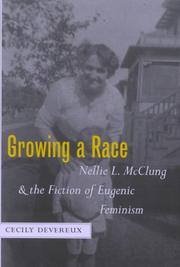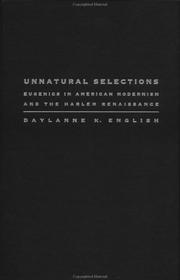| Listing 1 - 10 of 16 | << page >> |
Sort by
|
Book
ISBN: 9783826045530 382604553X Year: 2011 Publisher: Würzburg : Königshausen & Neumann,
Abstract | Keywords | Export | Availability | Bookmark
 Loading...
Loading...Choose an application
- Reference Manager
- EndNote
- RefWorks (Direct export to RefWorks)
Biology --- Biology in literature --- Eugenics in literature --- Social aspects
Book
ISBN: 9781469669823 9781469669816 Year: 2022 Publisher: Chapel Hill : University of North Carolina Press,
Abstract | Keywords | Export | Availability | Bookmark
 Loading...
Loading...Choose an application
- Reference Manager
- EndNote
- RefWorks (Direct export to RefWorks)
"In this book, Abby L. Goode reveals the foundations of American environmentalism and its enduring connections to racism, eugenics, and agrarian ideals. Throughout the nineteenth century, writers as diverse as Martin Delany, Charlotte Perkins Gilman, and Walt Whitman worried about unsustainable conditions such as population growth and plantation slavery. In response, they imagined 'agrotopias'-sustainable societies unaffected by the nation's agricultural and population crises-elsewhere. Though seemingly progressive, these agrotopian visions depicted selective breeding and racial 'improvement' as the path to environmental stability. In this fascinating study, Goode uncovers an early sustainability rhetoric interested in shaping, just as much as sustaining, the American population"--
Environmentalism in literature. --- Agriculture in literature. --- Eugenics in literature. --- Racism in literature. --- Sustainable agriculture --- History.
Book
ISBN: 0415806984 9780415806985 9780203097915 9781136224645 9781136224683 9781136224690 9781138109490 1138109495 0203097912 1136224696 1283710021 1136224688 Year: 2013 Publisher: New York Routledge
Abstract | Keywords | Export | Availability | Bookmark
 Loading...
Loading...Choose an application
- Reference Manager
- EndNote
- RefWorks (Direct export to RefWorks)
Biopolitics --- English literature --- Eugenics in literature --- Eugenics --- Literature and society --- Political behavior --- Human behavior --- Political science --- Sociobiology --- Homiculture --- Race improvement --- Euthenics --- Heredity --- Involuntary sterilization --- History --- History and criticism
Book
ISBN: 9780816651238 081665123X 9780816651245 0816651248 0816666423 Year: 2008 Publisher: University of Minnesota Press
Abstract | Keywords | Export | Availability | Bookmark
 Loading...
Loading...Choose an application
- Reference Manager
- EndNote
- RefWorks (Direct export to RefWorks)
American literature --- Atavism in literature. --- Atavism --- Biology --- Eugenics in literature. --- Human reproduction in literature. --- Literature and science --- Science and literature --- History and criticism. --- History
Book
Year: 2007 Publisher: Columbus : Ohio State University Press,
Abstract | Keywords | Export | Availability | Bookmark
 Loading...
Loading...Choose an application
- Reference Manager
- EndNote
- RefWorks (Direct export to RefWorks)
Book
Year: 2007 Publisher: Columbus : Ohio State University Press,
Abstract | Keywords | Export | Availability | Bookmark
 Loading...
Loading...Choose an application
- Reference Manager
- EndNote
- RefWorks (Direct export to RefWorks)

ISBN: 128352998X 9786613842435 0773573046 9780773573048 0773529373 9780773529373 6613842435 Year: 2005 Publisher: Montreal [Que.] McGill-Queen's University Press
Abstract | Keywords | Export | Availability | Bookmark
 Loading...
Loading...Choose an application
- Reference Manager
- EndNote
- RefWorks (Direct export to RefWorks)
Cecily Devereux reconsiders the extent to which McClung's enduring legacy of crusading for women's rights is founded on the ideas of British eugenicists such as Francis Galton and Caleb Saleeby and implicated in the passage of eugenical legislation in Canada. In a critical study of Painted Fires, the Pearlie Watson books, and several short stories, Devereux attempts to understand McClung's fiction in terms of its engagement with a politics of "race" and nation and constructions of specifically "racial" impurities that many women saw themselves as uniquely able to "cure."
Eugenics in literature. --- Feminism in literature. --- British --- British people --- Britishers --- Britons (British) --- Brits --- Ethnology --- Feminist theory in literature --- Social aspects. --- McClung, Nellie L., --- McClung, Nellie Letitia Mooney, --- Mooney, Nellie Letitia,
Book
ISBN: 0813562120 0813562112 1306129559 Year: 2013 Publisher: Piscataway Rutgers University Press
Abstract | Keywords | Export | Availability | Bookmark
 Loading...
Loading...Choose an application
- Reference Manager
- EndNote
- RefWorks (Direct export to RefWorks)
In When Sex Changed, Layne Parish Craig analyzes the ways literary texts responded to the political, economic, sexual, and social values put forward by the birth control movements of the 1910's to the 1930's in the United States and Great Britain. Discussion of contraception and related topics (including feminism, religion, and eugenics) changed the way that writers depicted women, marriage, and family life. Tracing this shift, Craig compares disparate responses to the birth control controversy, from early skepticism by mainstream feminists, reflected in Charlotte Perkins Gilman's Herland, to concern about the movement's race and class implications suggested in Nella Larsen's Quicksand, to enthusiastic speculation about contraception's political implications, as in Virginia Woolf's Three Guineas. While these texts emphasized birth control's potential to transform marriage and family life and emancipate women from the "slavery" of constant childbearing, birth control advocates also used less-than-liberatory language that excluded the poor, the mentally ill, non-whites, and others. Ultimately, Craig argues, the debates that began in these early political and literary texts-texts that document both the birth control movement's idealism and its exclusionary rhetoric-helped shape the complex legacy of family planning and women's rights with which the United States and the United Kingdom still struggle.
American literature --- English literature --- Women and literature. --- Birth control in literature. --- Feminism and literature. --- Eugenics in literature. --- Birth control --- Population control --- Pregnancy --- Family planning --- Contraception --- Reproductive rights --- Literature --- History and criticism. --- Social aspects --- Prevention --- Women authors --- Literature and feminism
Book
ISBN: 9780231138789 Year: 2009 Publisher: New York Columbia university press
Abstract | Keywords | Export | Availability | Bookmark
 Loading...
Loading...Choose an application
- Reference Manager
- EndNote
- RefWorks (Direct export to RefWorks)
Biology in literature --- Breeding in literature --- Breeding --- Education and heredity --- English literature --- Eugenics in literature --- Eugenics --- Heredity in literature --- Literature and science --- Nature and nurture --- Philosophy --- History --- History and criticism

ISBN: 0807863521 9780807863527 0807828688 9780807828687 0807855316 9780807855317 9798890877758 Year: 2004 Publisher: Chapel Hill University of North Carolina Press
Abstract | Keywords | Export | Availability | Bookmark
 Loading...
Loading...Choose an application
- Reference Manager
- EndNote
- RefWorks (Direct export to RefWorks)
In challenging conventional constructions of the Harlem Renaissance and American modernism, Daylanne English argues that in the 1920's, the form and content of writings by figures as disparate as W. E. B. Du Bois, T. S. Eliot, Gertrude Stein, and Nella Larsen were shaped by anxieties regarding immigration and intraracial breeding.
American literature --- Eugenics in literature. --- African Americans --- Modernism (Literature) --- African Americans in literature. --- Harlem Renaissance. --- Race in literature. --- Afro-Americans in literature --- Negroes in literature --- English literature --- Agrarians (Group of writers) --- New Negro Movement --- Renaissance, Harlem --- African American arts --- History and criticism. --- African American authors --- White authors --- Intellectual life --- 20th century --- History and criticism --- Eugenics in literature --- United States --- African Americans in literature --- Race in literature --- Du Bois, William Edward Burghardt --- Eliot, Thomas Stearns --- Stein, Gertrude
| Listing 1 - 10 of 16 | << page >> |
Sort by
|

 Search
Search Feedback
Feedback About UniCat
About UniCat  Help
Help News
News